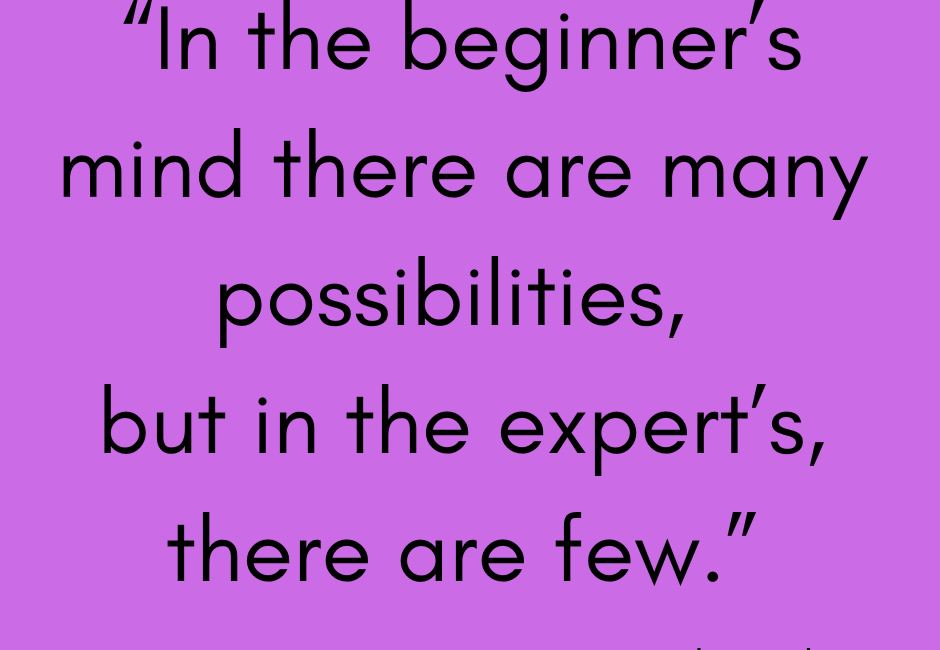First Unitarian Universalist Society Burlington
September 17, 2023
Somewhere in Asia – Japan or Malaysia or some other country – there is a picture on a Buddhist monk’s smart phone. It is of the dining hall at Changmyay Meditation Center just outside of Yangon, Myanmar, where everyone is eating mindfully, heads bent with mindful attention to each aspect of eating: reaching for spoon, scooping food onto spoon, carrying food toward body, opening mouth, chewing, placing spoon down. Reaching, scooping, carrying, opening, chewing, placing down. Reaching, scooping, carrying, opening, chewing, placing down.
In this picture floating on the iCloud of the universe, everyone’s head is bowed in proper posture as befitting mindful eating in Noble Silence at a Buddhist monastery…everyone’s head, except mine.
My head is upright, my eyes surveying this new experience – the men sitting at the front and the women at the back; all of us sitting at low tables while our bodies are not on chairs, but on mats on the floor. There I am, taking in the bowing monks and nuns and earnest laypeople who enter the room, then prostrate in front of the big Buddha statue by bowing, hands placed together at the heart, three times, forehead to ground, offering gratitude and humility before partaking in the meal.
There is photographic documentation of my dilemma, a dilemma we all face: do I focus inward or do I focus outward?
And relatedly: do I lean hard on what I already know or do I soften to curiosity?
As I watched this camera-laden monk – who, I would like the record to note, was also not eating mindfully – take this photo, I realized just what it depicted – me, head held high, probably smiling from ear to ear in delight and curiosity.
I had to laugh at myself. I was a beginner beholding the beauty of my unfamiliar circumstance and deeply appreciating it.
A quote from the 20th century Nobel Laureate and poetic father of India, Tagore Rabindrinath, rang in my ears:
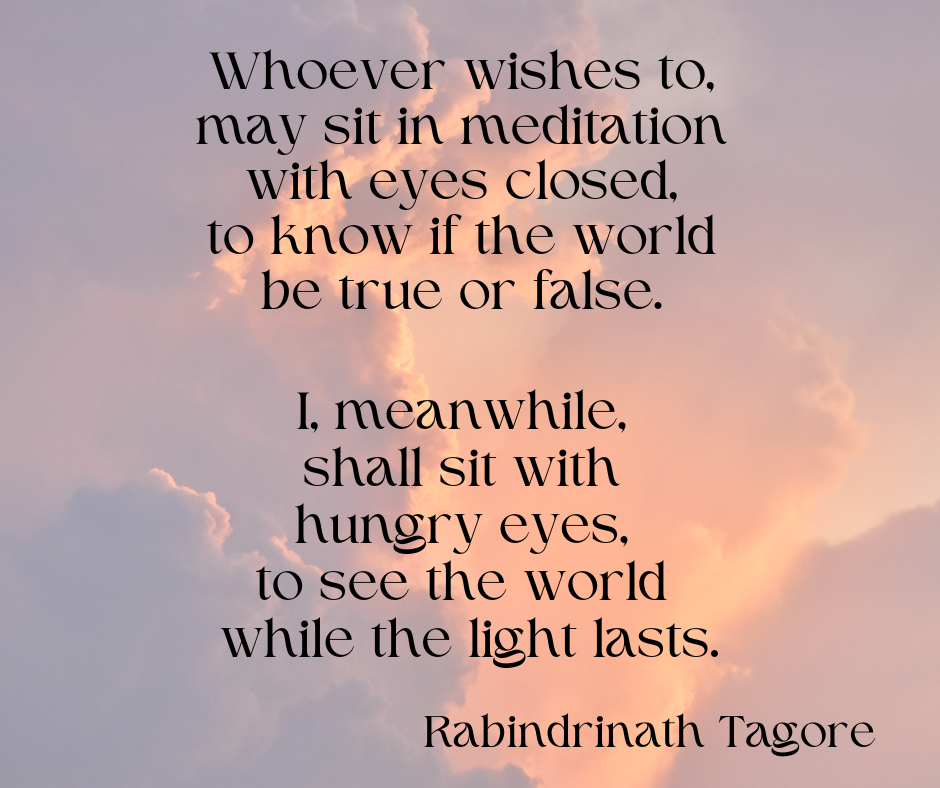
Are there any fans of Charlotte’s Web here in the sanctuary?
Like you, I am a fan of that book, and of the author, E. B. White, especially his book of essays, The Points of My Compass. In it, he wrote about the very same dilemma, just from a different perspective:
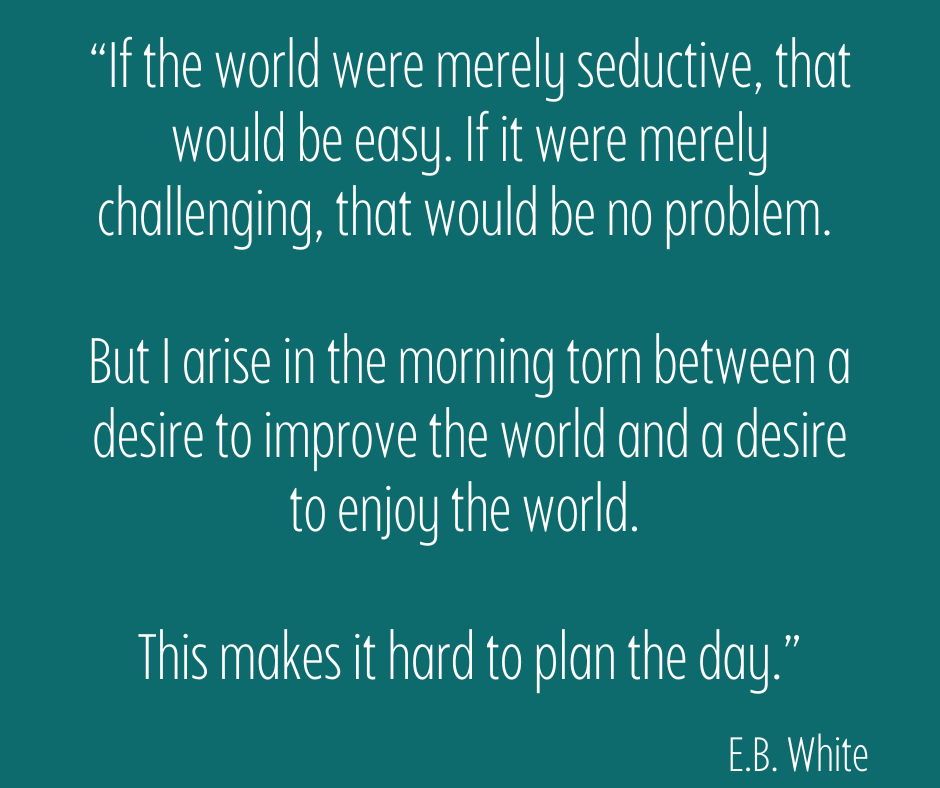
Facing inward? Facing outward? Both? Neither? Closed meditation eyes or hungry open eyes? It makes it hard to plan the day. Can I get an amen?
~~~
How about you? What shape is your movement between improving and enjoying take? What does your dance between savoring and saving look like?
Have you found some perfected balance that needs no tending?
Do you let such questions of discernment be for others?
Do you find your answer one day to be sufficient and the next day, lacking, and then the third or forth day, something akin to both?
And if we choose both ~ AS we choose both ~ saving AND savoring, how do we see the thousand beautiful things in our midst? How do we see the beauty that is obvious, but sometimes obscured by our busy lives? Or obscured by our own pain? How do we see the beauty that is present even in the midst of suffering, even in the midst of oppression, even in the midst of conflict, even in the midst of collapse?
And by beauty, I mean many things, but mostly I mean possibility.
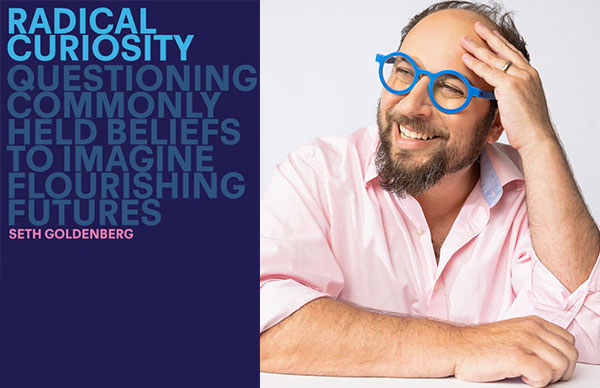
This past July, knowing that I was coming here to you, I read Seth Goldenberg’s 2021 book, Radical Curiosity: Questioning Commonly Held Beliefs to Imagine Flourishing Futures. It seemed great timing: to start a new ministry with a posture of radical curiosity.
In the book, Goldenberg wants to reclaim child-like wonder, or as it is often called: naïveté. He notes that the word, dilettante, means, in English, “frivolous dabbler,” a phrase with a negative connotation. Yet it comes from the Italian word, diletarre, which means to delight.
Pair that piece of trivia with the fact that the word amateur comes from the French word for love: amour, yet, in English, it often describes someone who is inept or bungling. Again, that negative connotation.
Goldenberg goes onto write
That we have ascribed pejorative meaning to so much of the vocabulary related to the joy of learning is telling. Why must we be contemptuous of the sheer delight of finding what one loves about the world? How else do we determine what’s worth knowing, unknowing, and remaking anew?
He notes,
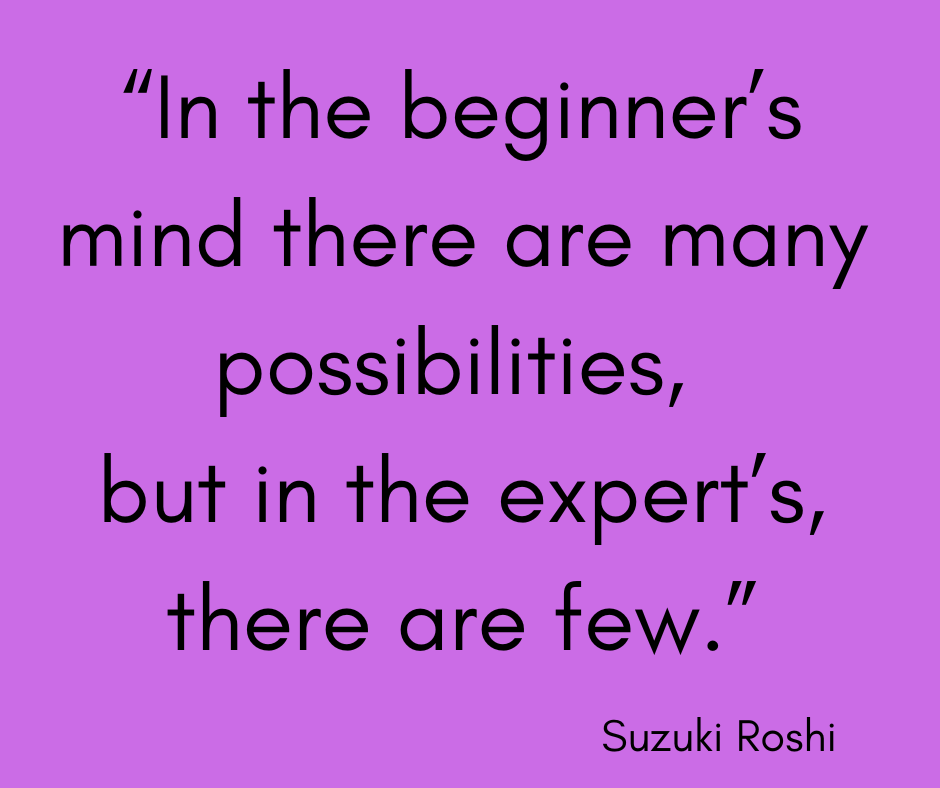
When something is known, it gets fixed in place. And when things are fixed in place, life can become stale. It’s the wrestling with the complexity of a dynamic, ever changing world that makes life interesting.
Naïvete as super power is akin to the Zen Buddhist concept of Shoshin, which is translated as “Beginner’s Mind.” This is an attitude of openness, eagerness, and a relative lack of preconceptions, just as someone new to a situation, or a beginner, brings. It is based on the idea, articulated by Suzuki Roshi in his book, Zen Mind, Beginner’s Mind, that
Oh, this resonates for me. It sounds so true. Yet, this can be hard. Maybe not for you, but for me.
I’m familiar with the pull to have the answer, to contribute something clever or profound to a conversation, to offer my expertise. I mean, I’m pretty sure that you didn’t call me as your Senior Minister because you were hoping that I would be a frivolous dabbler!
So, it can be hard for me to live into the invitation to be a beginner. Hard, but not impossible. Because a big chunk of my spiritual life is growing my comfort with uncertainty and my capacity to tolerate the unknown. It’s always been an important quality for any spiritual seeker, but post-pandemic, it’s a necessity. A necessity for spiritual seekers, a necessity for religious leaders, or leaders of any organization.
And I’m going to take a wild guess here and suggest that maybe, for some of you, it’s hard, too? We Unitarian Universalists have a well-earned reputation of taking comfort in, and perhaps even hiding behind, our competence, leading with our expertise. It’s appreciated in some arenas and in other spheres, it’s off-putting.
For some UUs, especially those of us with privilege as an identity marker, it can be harder to follow rather than lead. It can be harder to acknowledge we do not know the answer, opining at times when we should listen.
And just to connect the dots: when white supremacy culture and patriarchy is the air we breathe, the water we swim in, and the culture that wants to claim us, we can be persuaded to value expertise over curiosity, in ourselves and in others.
I want to invite you to join me in this practice of Beginner’s Mind. I want us all to practice a radical curiosity to go along with our radical welcome. I want us to remember, when things go wrong, either in our congregational life or in our personal life, bringing a fresh perspective – a Beginner’s Mind, a radical curiosity – just might save us when other tried and true efforts fail.
Because we can dabble, by which I mean, explore and be curious, without being frivolous about it: we can open to possibilities, curious about the potential for beauty all around us, able to see a thousand (or more) beautiful things.
And by beauty, I mean many things, but mostly I mean possibility.
We can do this because, no matter how long you have been here, this long-standing congregation is at all times being made anew; we are just its latest iteration. There is no need to sit on the laurels of “it’s the way we’ve always done it.” Instead, should we find that phrase crossing our lips, we can say, “why is it that we’ve always done it that way?” It is in that moment that radical curiosity opens the door to possibility. Which is a beautiful thing.

Each Wednesday, the UUA publishes a brief meditation, called Braver/Wiser. How many of you subscribe to this delight? For those of you who are interested, we’ll make sure to put into the enews a link to sign up. This past week, they published a meditation by my colleague, Rev. Tania Yadira Márquez. She was taking a poetry class and, quite to her surprise, as she listened to poetry and created some herself, a question presented itself to her:
What if I approached conflict like writing a poem?
Now, doesn’t that sound, if we are going to be realistic and pragmatic, well, naïve? I mean, there are plenty of us here in the room who have experience with conflict, might even be professional mediators, what you might call experts on the subject.
Yet, Rev. Márquez doubled down in the meditation, asking not only herself to approach conflict like writing a poem, but for all of us to consider doing so. She writes,
Poets are intentional about how to best deliver the message; how to best uncover the mystery of life so that others can experience it. Silences matter, too; part of the message is to pause, to wait, to leave space to breathe before the next line. ….
She concludes in her meditation:
What if, the next time I find myself in the midst of conflict, I can slow down and imagine I am about to write a poem? Then, conflict resolution […] would turn into a craft, a laboratory where beauty is created. There would be a slowing down that would help me connect with what I’m feeling so I can find the right words to share that experience, and a silence to let me listen to the poem of the Other.
Sounds to me like the best of radical curiosity, of approaching conflict with a Beginner’s Mind. And far from frivolous or naïve, but quite possibly one of the more pragmatic approaches to conflict I have heard in a long while. One that can perceive beauty and possibility even in the midst of difficult tension. A way that might lead to both savoring and saving, if not the world, then a little corner of it where conflict has emerged as part and particle of any healthy community.
~~~
So, yes to radical curiosity. Yes to savoring AND saving. Yes to improving AND enjoying. Yes to meditating with eyes closed AND seeing the world with hungry eyes. And a beginner’s mind.
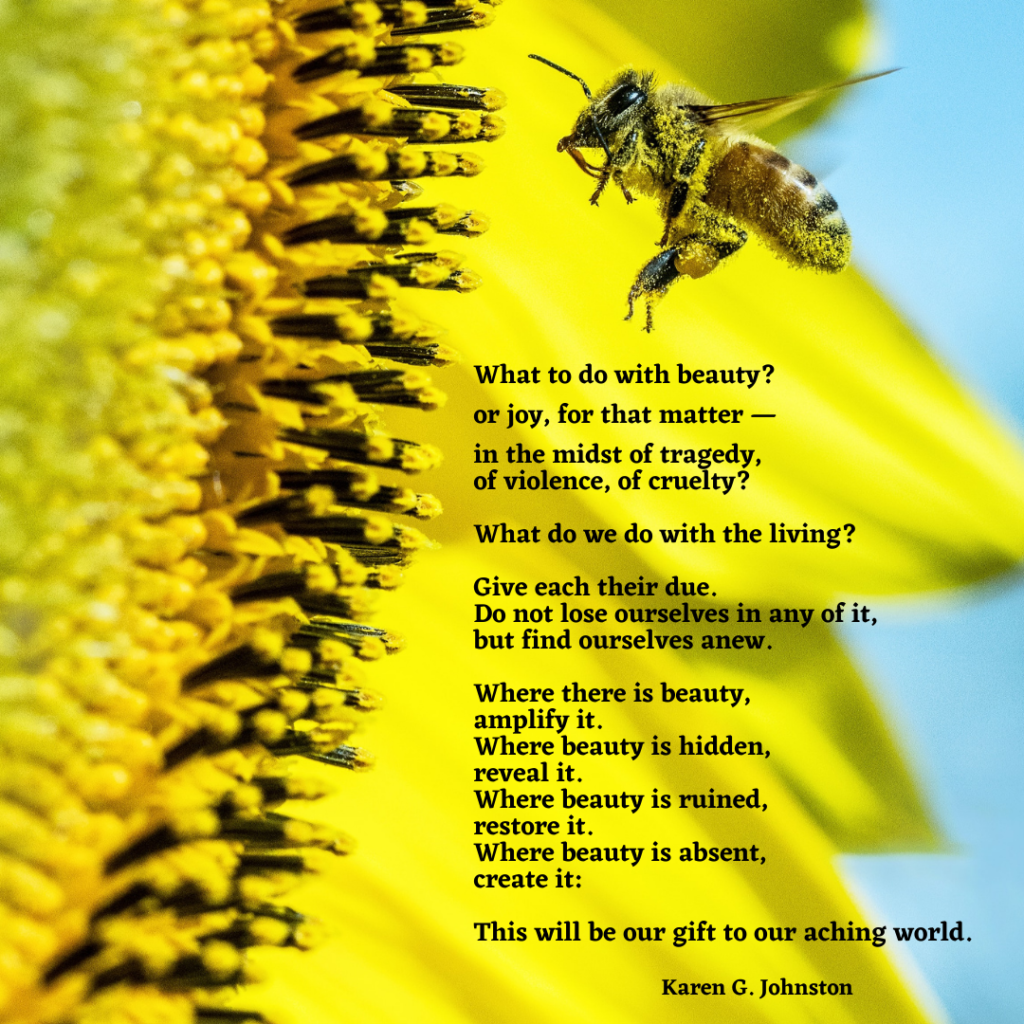
These concluding words come from my own hand, used to light the chalice on the morning I went before the Ministerial Fellowship Committee in December, 2015, on my path to becoming a fellowshipped Unitarian Universalist minister:


